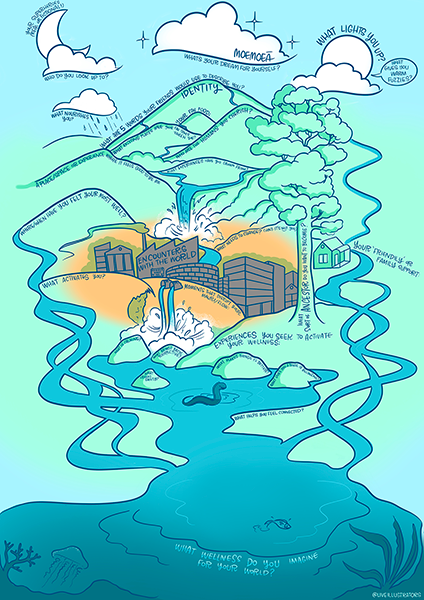Moving with Psychosis is a research project co-led by academics Matthew Jenkins (University of Otago) and Victoria Chinn (Te Herenga Waka – Victoria University), with other team members representing lived experience, physical activity, nutrition, and health psychology.
In 2020 Matthew and Victoria met and identified a common interest – supporting people living with mental illness to live healthy lives. They founded Moving With Psychosis, which uses co-design to create a system of support for the health and wellbeing of rangatahi experiencing psychosis.
This included a series of workshops to learn about experiences of wellbeing from young people who have experienced psychosis, which were facilitated by lived experience researchers. This meant that rangatahi whai ora were able to safely identify and share experiences of health and wellbeing with people like them.
“To be able to see people with lived experience in the workshops, relating to their trials and experiences, helps me understand there's hope for me,” said one of the rangatahi who took part in the workshops.
Rangatahi shared experiences in a variety of creative ways, from collage and sculpture to rap. “It was loud, it was colourful... the energy in the room was fantastic,” says Matthew.
Equipped with these first-hand experiences, the project team approached MHAIDS’ Early Intervention (in Psychosis) Service (EIS) for help developing the system of support. EIS provides support, treatment and information to young people who are experiencing psychosis for the first time and were able to identify opportunities and available resources to further scope the support system.
“Experiencing psychosis can be very isolating, so having a chance to come together with other young people with similar experiences and attend to wellbeing in ways that they choose is something we think will be really beneficial,” says EIS Team Leader Ray McEnhill.
“Maintaining good physical health can be a real challenge for our rangatahi for several reasons, and the opportunity to address this in an innovative, creative way is so important.
“The team is keen to support this project in any way it can.”
Together with rangatahi whai ora, whānau members, and the project team, EIS staff contributed to co-design of a prototype system that consisted of several key elements:
This system was then presented back to the rangatahi whai ora for feedback.
The project team also reached out to the League of Live Illustrators, who collaborated with rangatahi whai ora and the project team to create three pieces of art: one that provided a framework that guided the co-design process itself, another that shows the experiences of rangatahi around health and wellbeing, and a final illustration that visualises Te Hekenga Whaiora – The Journey to Wellness framework for supporting rangatahi whai ora.
Click to open the full-size images.
/lived-experience-of-rangatahi-600.png)

/te-hekenga-whaiora-600.png)
In addition to payment for contributing to the project, participants were each given a framed illustration as koha.
These resources can now be used to support the wellbeing of other young people experiencing psychosis.
Next steps
The project has just received extra funding from the Health Research Council and Lottery Health for this project, enabling the health and wellbeing programme to be rolled out early next year.
This programme consists of 12 weekly two-hour sessions for rangatahi whai ora. The first hour focuses on building knowledge or providing a space for other experiences (e.g., creative expression), while in the second hour the rangatahi will undertake some form of physical activity. The team has partnered with Nuku Ora to deliver these sessions.
Six of these sessions were co-designed during the previous stage of the project and will include topics such as understanding medication and ‘getting the basics right’ (e.g., enhancing physical activity and nutrition knowledge). The remaining six sessions will be co-designed with the participants in a session run by co-design specialists Studio C.
The programme will primarily be evaluated by measuring engagement in the programme and self-perceived holistic wellbeing, through a combination of interviews, focus groups, and surveys.
In addition, a separate session will be held with mental health service providers and external providers in physical activity and nutrition spaces, both as an informal professional development and as a way of building relationships amongst these sectors to better support rangatahi whai ora in the future.